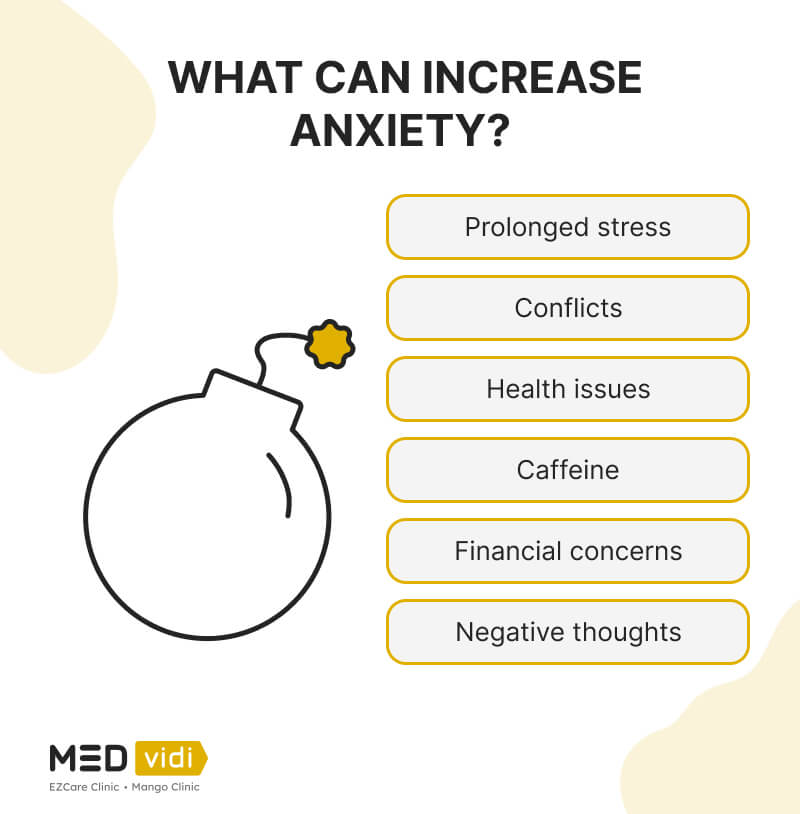

Understanding the silent triggers behind daily anxiety struggles is a fundamental step in managing this prevalent condition. Anxiety, while a normal human experience, can become overwhelming when left unaddressed. This often manifests as persistent worry, racing thoughts, physical symptoms, and difficulty concentrating. Identifying the root causes behind your anxieties is key to developing effective coping mechanisms and reclaiming your peace of mind. This article dives deep into the subtle and often overlooked triggers contributing to daily anxiety, offering practical solutions for a more calm and fulfilling life. We will explore several key areas including lifestyle factors, environmental influences, and personal thought patterns, providing actionable strategies for managing your anxiety effectively.
Identifying Underlying Anxiety Triggers
Understanding the Root Causes of Anxiety
Anxiety isn’t always obvious; sometimes, the triggers are buried deep beneath the surface, manifesting as seemingly insignificant events or thoughts. Identifying these silent triggers is the first step towards effectively managing and reducing anxiety. Sometimes, it’s a reaction to a stressful work deadline, an upcoming presentation, or even a simple disagreement with a loved one. However, in many cases, the underlying issues extend far beyond immediate events, often stemming from accumulated stress and a lack of self-care. Often, these hidden stressors can impact daily functioning, leading to feelings of overwhelm and exhaustion. Recognizing the specific situations or internal patterns that consistently trigger your anxiety can help you to address the source of the problem and create solutions for managing your reaction to those triggers.
Examining Lifestyle Factors
Diet, Exercise, and Sleep Patterns
A healthy lifestyle is crucial for managing anxiety. Poor diet, lack of exercise, and inconsistent sleep patterns can significantly exacerbate anxiety symptoms. A diet rich in processed foods, excessive caffeine, or alcohol, can increase anxiety and make managing the condition more difficult. Studies have shown a strong correlation between regular exercise and reduced anxiety levels. Physical activity releases endorphins, which have mood-boosting effects, and helps reduce stress hormones. Furthermore, consistent sleep is essential for emotional regulation and overall well-being. Lack of sleep can make you more susceptible to anxiety and make it more challenging to manage.
The Impact of Environmental Factors
Social Pressures and Unresolved Conflicts
The environment plays a significant role in triggering anxiety. Pressures from social interactions, family conflicts, or work-related tensions can all contribute to anxiety. Examining these external factors can provide crucial insights into the origins of anxiety. In many cases, unresolved conflicts or interpersonal issues can trigger a cascade of stress and anxiety symptoms. It’s important to acknowledge that these conflicts aren’t always easily resolved, but identifying them and acknowledging their impact can be a powerful first step in learning strategies to manage your reaction to these situations.
Exploring Personal Thought Patterns
Negative Self-Talk and Cognitive Distortions
Personal thought patterns are a powerful catalyst for anxiety. Negative self-talk, perfectionism, or catastrophizing are common cognitive distortions that can amplify anxiety. Understanding how you perceive and interpret situations is key. For instance, a perceived criticism at work might be interpreted as a personal attack, leading to significant anxiety. By recognizing these thought patterns, you can challenge and reframe them, leading to more constructive ways of thinking and reducing the anxiety triggered by these thoughts. This often involves cognitive behavioral therapy (CBT), a well-researched approach for managing anxiety by changing negative thought patterns.
Practical Coping Strategies
Mindfulness, Self-Compassion, and Professional Guidance
Effective coping strategies are essential for managing anxiety. Practicing mindfulness techniques, like deep breathing exercises or meditation, can help ground you in the present moment and reduce anxiety triggers. Self-compassion is another critical component. Be kind to yourself during difficult times, recognize that everyone experiences anxiety, and avoid self-criticism. Seeking professional guidance from therapists or counselors can be invaluable in developing personalized strategies tailored to your unique needs. They can help you identify the root causes of your anxiety and develop effective coping mechanisms to help manage your daily anxiety struggles.
Q2: How can I challenge negative thought patterns that contribute to my anxiety?
A2: Recognize negative thought patterns when they arise. Ask yourself if these thoughts are realistic. Consider alternative perspectives. Challenge the evidence supporting these thoughts. Replace negative thoughts with more balanced and realistic ones. Practice self-compassion, remembering that everyone has moments of doubt and negative thinking. Cognitive Behavioral Therapy (CBT) techniques can help to restructure your thought patterns to develop healthier responses to situations.
Q3: Are there specific mindfulness exercises that can help manage anxiety?
A3: Absolutely! Deep breathing exercises, such as box breathing, can help regulate your nervous system. Guided meditations can help quiet the mind and focus on the present moment. Mindful walking, where you pay attention to the sensations in your body while walking, can help connect you with the present and reduce anxious thoughts. Progressive muscle relaxation techniques can reduce physical tension associated with anxiety.
Q4: When should I consider seeking professional help for my anxiety?
A4: If your anxiety is significantly impacting your daily life, relationships, or overall well-being, it’s crucial to seek professional help. A therapist or counselor can provide personalized support to address the underlying causes of your anxiety and develop effective coping strategies. If anxiety is interfering with your ability to function at work, school, or in social settings, seek professional guidance immediately. Symptoms like panic attacks, difficulty sleeping, or persistent worry warrant professional intervention.
In conclusion, understanding the silent triggers behind daily anxiety struggles is crucial for effective management. By identifying these triggers, you can proactively develop coping strategies and build resilience. Take the next step by exploring mindfulness exercises, practicing self-compassion, and seeking professional guidance if needed. This journey of self-discovery will empower you to navigate anxiety and cultivate a more peaceful and fulfilling life. Take control of your anxiety today!